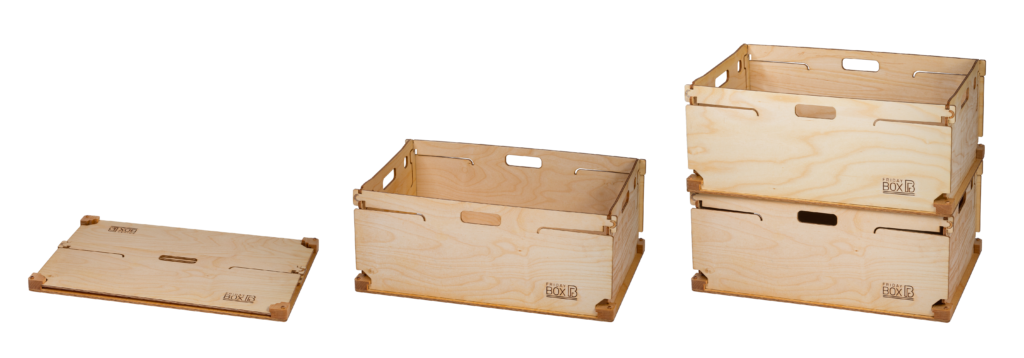by Eva Gradl
The Intersection of Foldable Box and Campervan Kitchen
Sustainable and collapsible—not only are these the core elements of the FridayBox, but they also form the central theme of my master’s thesis. As part of the double master’s program “Global Challenges and Sustainable Developments,” I developed a campervan kitchen at Tongji University in Shanghai and the University of Applied Arts Vienna. This kitchen combines efficient storage with sustainability throughout the entire product lifecycle. The collaboration with SHŌUSUŌ Kitchen demonstrates the versatile applications of the FridayBox and the potential in merging compact design with ecological responsibility.
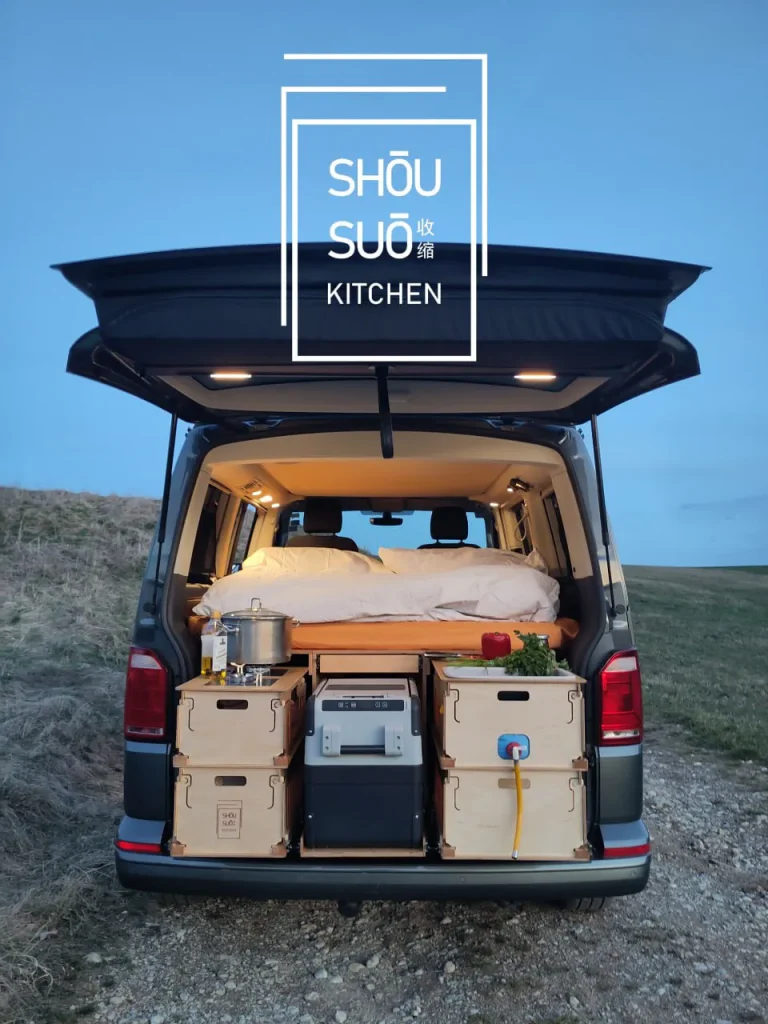
The Market Gap: Why We Need Another Campervan Kitchen
Anyone familiar with campervan kitchens knows there are already dozens on the market. So why do we need another one? Many people want to use their vehicle flexibly—for spontaneous camping trips, daily transport, or even car-sharing services. This multifunctionality requires a highly flexible campervan kitchen that seamlessly integrates into everyday life through easy installation and removal, comfortable carrying, and effortless storage until the next adventure calls. People with limited living space without a basement or garage often face the challenge: Where to store the camper kitchen when it’s not needed in the car? Traditional models are often bulky and can’t be stored in living spaces, making a campervan kitchen impractical for many. As a result, the kitchen often remains in the car, permanently occupying space, increasing fuel consumption, and limiting the vehicle’s flexibility.
From Raw Material Extraction to Disposal: A Holistic Approach to Sustainable Product Design
Beyond functionality, sustainability is at the heart of this project. Product design and associated consumption are closely linked to central challenges of our time, such as resource depletion, waste production, environmental pollution, and climate change. Industrial designers and engineers play a crucial role by developing solutions during product development that minimize the ecological footprint. This thesis takes an innovative approach by combining the development of a collapsible campervan kitchen with holistic lifecycle thinking. Unlike conventional projects, sustainability is systematically integrated across all phases of the product cycle—from raw material extraction through production and transport to use and disposal. The development from the initial concept to a fully functional prototype is based on evidence-based decisions, supported by selected methods like material analyses and the Finite Element Method (FEM) for lightweight construction.
Collaboration Between Shanghai and Dormagen: From CAD Model to Fully Functional Prototype
After initial calculations and designs, the basic concept of a plywood kitchen emerged, which can be compactly stored by folding and nesting. In addition to the three-part kitchen body that also serves as a bed extension, the kitchen was intended to consist of four extendable and foldable wooden boxes. This is where the FridayBox comes into play: a video call between Shanghai and Dormagen quickly showed that our products perfectly complement each other. The collaboration extended beyond integrating the FridayBox and evolved into a fruitful on-site exchange. Following the detailed design phase in Shanghai, the first part of implementing the CAD model began in January 2024 at Michael’s development workshop in Dormagen. Michael’s extensive experience and expertise, along with comprehensive testing and manufacturing capabilities, allowed for continuous adjustments and precise execution of production steps in a real startup environment.
The Finished SHŌUSUŌ Kitchen: Combining User-Friendliness and Sustainability
User Benefits:

- Maximum Function, Minimal Storage: SHŌUSUŌ Kitchen sets new standards by offering maximum functionality while consuming minimal storage space. It combines all essential camping features, including a two-burner stove, spacious cooler, large water tank, and ample workspace with a sink for washing dishes and food preparation. The foldable cooker and sink units, based on the FridayBox, provide sufficient storage for food and various cooking utensils. Additionally, the kitchen serves as a bed extension for the folded rear seat, ensuring restful sleep on the go. During travel, the mattress can be conveniently folded and placed on the kitchen to optimize vehicle space. Installed in the vehicle, the dimensions are 1212 x 620 x 530 mm (0.4 m³). When the cooler, cooker, and sink units are extended, the kitchen measures 1212 x 1220 x 530 mm (0.8 m³), offering generous space for cooking. By folding and nesting, the kitchen can be reduced to a compact 449 x 620 x 700 mm (0.2 m³)—a 50% reduction in volume compared to its in-vehicle size. True to its name, SHŌUSUŌ (收缩) means “compress” in Mandarin.
- Easy Handling: The vehicle can be converted into a camper or transporter in under 10 minutes. Assembly and disassembly are clear and intuitive, proceeding systematically from top to bottom and vice versa. The kitchen can be quickly and effortlessly secured with quick-release fasteners in the existing rail system of VW T5 and T6 models. Its compact size allows for easy maneuvering through doors and tight spaces. Carrying handles on the cooler also ensure comfortable transport.
- Aesthetic and Practical Storage for Living Spaces: When not serving as a fully equipped mobile kitchen, SHŌUSUŌ transforms into a compact coffee table. Its thoughtful design reduces storage needs and optimizes living space utilization. In its stowed state, the kitchen becomes a practical table with a wooden aesthetic that easily integrates into various rooms.
- Flexible Kitchen System: With three independently extendable drawer units, the kitchen system offers exceptional flexibility. The stove, sink, and refrigerator can be extended simultaneously, individually, or in any combination to quickly adapt the kitchen to individual needs. The design ensures all utensils are always within reach and nothing is obstructed. Without extending the kitchen, the faucet can be accessed through a front cutout. The flexible, positionable hose ensures neither the kitchen nor the car gets wet, allowing for easy refilling of water bottles or quick rinsing of an apple.
- Cooking with a View: The portable cooking station enables outdoor cooking—whether it’s ratatouille on the beach or coffee on a park bench. Equipped with all necessary cooking utensils and spices, the box can also serve as a small table, ideal for placing cups or other items. In winter, the entire cooking station can be used inside the vehicle with proper ventilation.
- Rain-Protected Cooking: Thanks to the flexible, three-part pull-out system, cooking is fully sheltered from rain. By extending only the cooker and sink units, you can stand comfortably between them while the area is completely covered by the tailgate.
- Compact Storage with Integrated Space for Camping Gear: Since the cooler is the largest non-collapsible element, the storage concept was developed around it. The design allows all other kitchen components—cooker, gas bottles, windscreen, sink, faucet, water tank, and fastening screws—to be stored within the compact solution. Additional space is available for extra camping accessories, ensuring all necessary items are in one place and nothing is lost or requires tedious searching before a trip.
- Less Is More: The selection of multifunctional equipment, such as compact foldable stoves and ultra-light windscreens suitable for hiking gear, eliminates the need for additional equipment. The cooker and sink units, based on the FridayBox, are easily removable due to their flexible fixation and can be used as transport boxes, for example, when shopping during trips.
- Low Power Consumption for Wilderness Adventures: For off-grid adventures, low power consumption is crucial. The energy-efficient cooler (Class B) is ideal for users with a second battery that charges only while driving, making it perfect for long road trips.
- Maximizing Passenger Capacity: Even when installed, the compact design leaves room for up to seven seats, enabling shared adventures with a minimized ecological footprint.
- Safe and Quiet Travel: All built-in drawers feature a locking mechanism to prevent unintended sliding during travel or shifting while cooking. Elastic bands provide easy access to stored food and keep items secure during transit. Even on rough roads, the journey remains smooth and rattle-free, thanks to SHŌUSUŌ Kitchen’s thoughtful design.

Sustainability Benefits:
Adhering to lifecycle thinking principles, the SHŌUSUŌ Kitchen emphasizes sustainability and minimizes environmental impact throughout all product lifecycle phases:
Raw Material Extraction:
- Sustainable Material Selection: Material analysis revealed that wood, particularly fast-growing birch, is a sustainable option compared to other common materials when considering the entire lifecycle. Potential fuel savings from using lighter aluminum are negligible compared to the significant environmental impact of bauxite processing.
- Material Reduction: To further reduce raw material extraction, wooden solutions were developed for flexible connections. The Finite Element Method (FEM) was applied to optimize material usage for the stove’s steel plate.
Manufacturing the SHŌUSUŌ Kitchen
- Waste Minimization: Optimization software for cutting wooden panels minimizes waste during production, enhancing resource efficiency.
- Efficiency: Uniform components and standardized fasteners simplify production and reduce tooling requirements.
- Local Production: The prototype was manufactured in regional workshops in Germany. For mass production, supporting the local economy and reducing transport emissions are vital.
- Renewable Energy: Utilizing solar energy in production lowers CO₂ emissions and increases manufacturing energy efficiency.
- Social Responsibility: Collaboration with organizations like Lebenshilfe promotes the integration of people with disabilities into the workforce.
Distribution and Transport:
- Compact Packaging: The collapsibility offers two key transport advantages: reduced costs and lower CO₂ emissions, as the compact format allows more products per shipment.
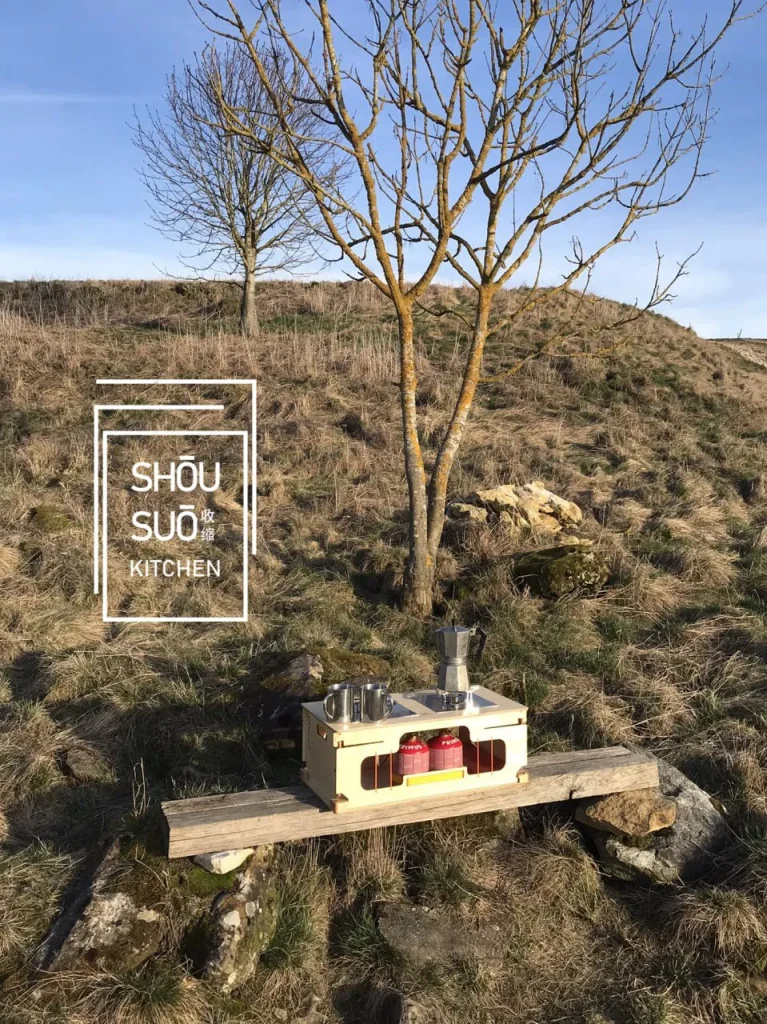
Customer Usage Phase:
- Versatile Vehicle Use: Easy installation and removal, comfortable carrying, and compact storage maximize vehicle flexibility. This multifunctionality reduces the need for additional vehicles and suits car-sharing models.
- Fuel Consumption and Energy Efficiency: The kitchen remains in the vehicle only when needed, reducing fuel consumption. The chosen cooler, with an energy consumption of 0.175 kWh/24h (Energy Efficiency Class B), operates efficiently. A large, foldable windscreen ensures efficient gas usage when cooking.
- Durability: Longevity is crucial for sustainability in this product category. A natural wax-oil coating protects the wood, extending the kitchen’s lifespan.
- Easy to repair: To maximize service life, it is also crucial that all wearing parts are designed to be as easy to repair and replace as possible.
One example of this is the orange elastic straps that secure food and equipment during the journey.
If these straps lose tension, they can be easily serviced.
As they are not glued, they can be easily tightened and shortened if necessary.
The end of the strap can be sealed with a lighter and then pressed back into the zigzag groove, which holds the strap in place by friction.
- Maximizing Passenger Capacity: The kitchen’s dimensions allow for additional seats in the rail system, accommodating up to seven people and potentially eliminating the need for extra vehicles.
- Multifunctionality of Integrated Products: Versatile use of integrated products reduces the need for extra camping gear during hikes.
End of Life: SHŌUSUŌ Kitchen
- Design for Disassembly: Avoiding mixed materials and adhesives facilitates component separation and recycling.
- Circular Economy: A natural coating classifies the wood as Waste Wood Category 2, allowing for thermal utilization or the production of new materials like chipboard.
From Space Constraints to Kitchen Innovation
The idea for the SHŌUSUŌ Kitchen arose because my previously built campervan kitchen, though modular, was difficult to install and remove and occupied significant storage space when not in use—much like existing market options. The fully functional SHŌUSUŌ Kitchen prototype has already proven itself on various camping trips and as a side table in the living room. So, what’s next? Given its numerous user and sustainability benefits, one might wonder: where can you buy this fantastic campervan kitchen? Currently, it’s not available for purchase, but stay tuned to see where the journey of the SHŌUSUŌ Kitchen and the FridayBox leads next.
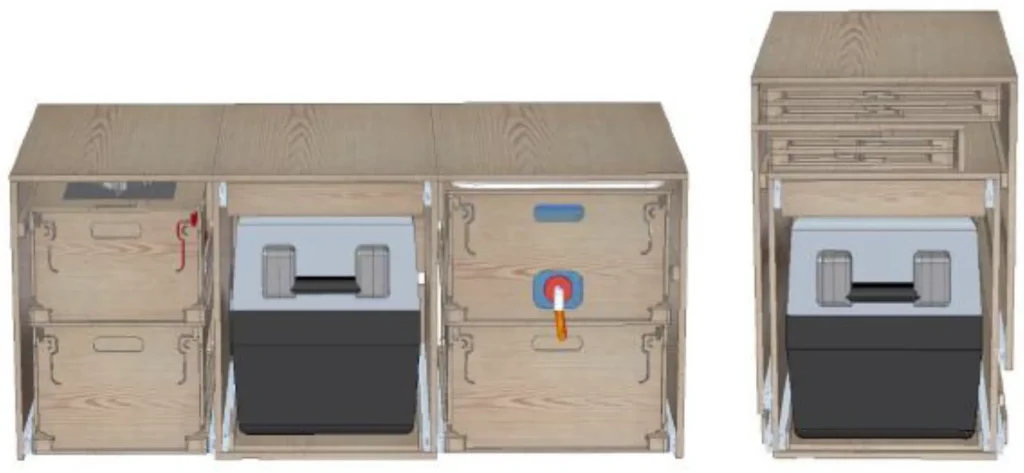
I would like to extend my heartfelt thanks to the team at Varius Werkstätten. A special thanks to Michael, whose enthusiasm for innovation, extensive knowledge, and exceptional hospitality greatly enriched my master’s thesis work.
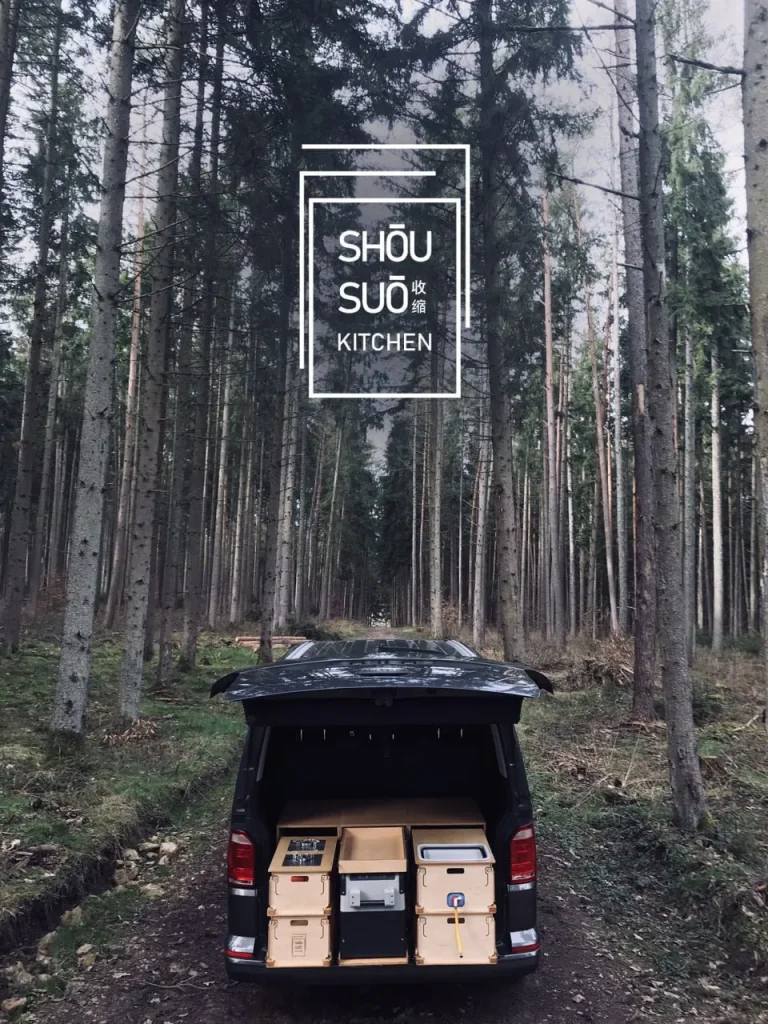
Contact
Eva Gradl, SHŌUSUŌ Kitchen
E-Mail: eva.gradl@posteo.de
LinkedIn: https://www.linkedin.com/in/eva-gradl/
Instagram: evaefaepha

